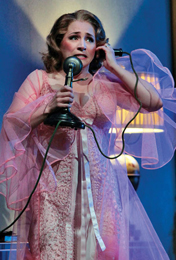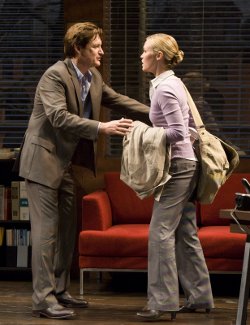 I’ve been so preoccupied with the fast-approaching publication of Pops that I haven’t had much time to think about The Letter. Today I’m thinking about it in a great big way. A few days ago I was told that Opera News had just published a hats-off review of the premiere performance. That review, by Simon Williams, is now available online:
I’ve been so preoccupied with the fast-approaching publication of Pops that I haven’t had much time to think about The Letter. Today I’m thinking about it in a great big way. A few days ago I was told that Opera News had just published a hats-off review of the premiere performance. That review, by Simon Williams, is now available online:
Interest in the new opera at Santa Fe this year ran especially high. The Letter (seen Aug. 7), composed by Paul Moravec to a libretto by Terry Teachout based on W. Somerset Maugham’s 1927 play, was intended to be an instantly accessible work with wide popular appeal. It may be just that. For a start, the opera is an improvement on the play, which is verbose, faultily structured and moralistic; instead, Teachout’s terse libretto recaptures the stringent economy of the much finer story, also by Maugham, upon which the play is based….
Moravec’s score is richly orchestrated and, like much of modern opera, functions like music for the movies; it amplifies emotions, emphasizes confrontation and crisis and drives the action forward. But it also creates a dramatic world in which singing seems to be the only appropriate medium. The thematic and structural unity of the music is not readily apparent at first hearing, but as a dramatic language it is often thrilling. Reminiscences of love are heard through the lush harmonies of nineteenth-century opera. Legal negotiations are harsh and staccato, with voices and orchestra disconnected. A brilliant satire of the gossipy, racist culture of British colonialism is built on jazz rhythms of the 1920s, and Leslie’s suicide, accompanied by brutal chords, is a mighty impressive finale. Teachout’s libretto allows the music space to explore the layers of the drama and leaves time for atmospheric interludes bordering on the eerie between the nine scenes of the action.
It would have been difficult to muster a stronger cast for the premiere. Patricia Racette had to represent a more conflicted and contradictory character than the central figure in either Maugham’s story or play, and there was a danger that the coexistence of passion and coldheartedness could strain credibility. But Racette’s consistently powerful singing and flamboyant command of melodrama–at times she seemed a dead ringer for Joan Crawford–carried the day. James Maddalena, as the lawyer, Howard Joyce, who is drawn into corruption by loyalty to his friends, gave a psychologically subtle portrayal of moral ambivalence and, in a soliloquy recalling Captain Vere’s final solo in Billy Budd, raised the dilemma that Joyce finds himself in to the level of tragedy. The robust baritone of Anthony Michaels-Moore might have been too strong for the broken figure of Robert Crosbie, the betrayed husband, but he represented moral weakness, emotional dependence and alcoholic indulgence with such devastating detail that Crosbie seemed symbolic of the corruption at the heart of the entire colonial enterprise….
Will The Letter find its way into the repertoire? The warm response of the Santa Fe audience suggests the work may have legs…
We sure hope so.
* * *
Read the whole thing here.

 Be that as it may, this is Phillip Lopate’s book, not mine or anybody else’s, and it’s mostly a fine one. Even where I take issue with his priorities, I have no trouble appreciating them, which is all you can ask of an anthologist (except for an index). John Simon, for instance, surely deserves to have been represented by more than two pieces, but had I been the editor of American Movie Critics, I would have made sure to include, as Lopate does, his reviews of The Last Picture Show and Chinatown:
Be that as it may, this is Phillip Lopate’s book, not mine or anybody else’s, and it’s mostly a fine one. Even where I take issue with his priorities, I have no trouble appreciating them, which is all you can ask of an anthologist (except for an index). John Simon, for instance, surely deserves to have been represented by more than two pieces, but had I been the editor of American Movie Critics, I would have made sure to include, as Lopate does, his reviews of The Last Picture Show and Chinatown: The Los Angeles revival of David Mamet’s “Oleanna” that I praised in this space in July has now transferred to Broadway. The big difference is that it’s being acted on a proscenium stage in New York, which diminishes the fist-in-the-face impact that Doug Hughes’ production had when I saw it on the thrust stage of the Mark Taper Forum. I think this may explain why the play seems to get off to a slower start: Bill Pullman has to work harder to fill the space of the John Golden Theatre, and in the first scene it feels as though the play is catching up with his twitchy, hyperactive performance as a college professor charged with sexual harassment. Once Mr. Pullman and the script get into sync, though, “Oleanna” flies to the finish line, and Julia Stiles is terrific throughout…
The Los Angeles revival of David Mamet’s “Oleanna” that I praised in this space in July has now transferred to Broadway. The big difference is that it’s being acted on a proscenium stage in New York, which diminishes the fist-in-the-face impact that Doug Hughes’ production had when I saw it on the thrust stage of the Mark Taper Forum. I think this may explain why the play seems to get off to a slower start: Bill Pullman has to work harder to fill the space of the John Golden Theatre, and in the first scene it feels as though the play is catching up with his twitchy, hyperactive performance as a college professor charged with sexual harassment. Once Mr. Pullman and the script get into sync, though, “Oleanna” flies to the finish line, and Julia Stiles is terrific throughout…